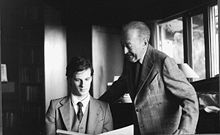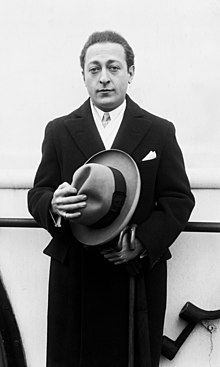Jascha Heifetz
Jascha Heifetz (originally Russian Иосиф Рувимович Хейфец, Jossif Ruwimowitsch Heifetz; * January 20 . Jul / 2. February 1901 greg. In Vilnius , Russian Empire ; † 10. December 1987 in Los Angeles , California , USA ) was a Russian-American Violinist. He is one of the most famous violinists of the 20th century.
Life
Heifetz was born into a Jewish family in Vilnius. His father Ruvim Heifetz was a professional violinist. He started his son's education when he was three years old. With five years Heifetz was at the Imperial Music School of Elias Malkin taught and played as a child prodigy at the age of six years, the Violin Concerto by Felix Mendelssohn Bartholdy . In 1910 Ovanes Nalbandian (Ioannes Arakelovich Nalbandian, 1871–1942) and from 1911 the important violin teacher Leopold Auer accepted him into his master class at the St. Petersburg Conservatory . Heifetz gained his first international experience in Germany, where he gave concerts in Berlin in 1912 and in Leipzig in 1913. In 1914 he appeared as a soloist with the Berliner Philharmoniker under Arthur Nikisch .
In 1917 he emigrated to the United States of America , where he made his concert debut at Carnegie Hall , New York City , that same year . In the years that followed, his reputation as a famous violinist was consolidated. In the following years concert tours with well-known conductors and orchestras to Australia, Asia, Europe and America followed. He gave up to 200 concerts a year. In 1925 he was naturalized in the USA. After 1933 Heifetz no longer performed in Germany, but he remained loyal to German music. The propaganda of the National Socialists spread that his playing was emotionally cold and stylized him as the typical example of a soulless Jewish violinist. Despite the obvious lack of substance, the allegations were repeated over and over again. In 1953 he was assaulted by an unknown person after a concert in Jerusalem in which, contrary to a ban, he had also played Richard Strauss ' sonata.
As a late romantic, Heifetz interpreted with great feeling in a highly individual way in the spirit of his time. His mastery of the instrument was considered unsurpassed, the precision of his playing set standards. The most noticeable characteristic of his playing was his intense tone. He refrained from emphasizing his playing with movements of his body, both in technical virtuoso and in lyrical passages.


In 1959 he was appointed professor of violin at the University of Southern California and taught there until 1983. His most famous students were Pierre Amoyal , Erick Friedman, Eugene Fodor and Rudolf Koelman . After him, the endowed professorship “Jascha Heifetz Chair of Music” was established, which is awarded to outstanding violinists for a limited period of time. His characteristic qualities as a violin teacher - careful listening and sparing, exemplary intervention - he demonstrated early on in numerous sound film documents. His work as a participant in a prominent piano trio (with Arthur Rubinstein , piano, and Gregor Piatigorsky , violoncello) is exemplarily documented by a sound film fragment converted into a longer video.
With the exception of Dvořák's concerts, Heifetz has recorded numerous classical and romantic violin concertos; In addition, the recordings of concerts by Erich Wolfgang Korngold , Miklós Rózsa , Sergej Prokofjew , William Walton and other of his contemporaries are groundbreaking.
Heifetz has published numerous transcriptions and arrangements and many chamber music works. The already mentioned piano trio recordings with Arthur Rubinstein (piano) and Emanuel Feuermann (cello) (or later with Gregor Piatigorsky), a line-up that went down in music history under the nickname “Million Dollar Trio” , are particularly well known .
All in all, his musical career is almost completely documented on video and sound carriers, with the sound carriers being particularly impressive due to their quality. The oeuvre was published under the titles The Heifetz Collection by BMG and The Complete Album Collection by Sony . He gave his farewell concert on October 23, 1972 in Los Angeles (Dorothy Chandler Pavilion) a. a. with three movements from the Partita No. 3 in E major for violin by Johann Sebastian Bach alone , which document the immaculate solo playing of the 71-year-old.
Heifetz was married twice, from 1928 to 1946 to Florence Vidor . This marriage resulted in two children, Josefa and Robert. He was married to Frances Spiegelberg from 1947 to 1963. From this marriage the son Joseph ("Jay") was born. Both marriages ended in divorce.
There is disagreement about the correct year of birth. The year of birth of the "official" biography is 1901, but occasionally 1899 or 1900 are also given. Jasha's mother is said to have secretly made him two years younger. A reason for this is not known.
Heifetz owned three violins: a Carlo Tononi, an Antonio Stradivari and a Guarneri del Gesù , his favorite concert instrument.
His grandson Danny Heifetz is also active as a musician, including as a drummer for Mr. Bungle .
Filmography
- Peter Rosen: God's Fiddler: Jascha Heifetz (2011).
- Nathan Kroll: The Heifetz Master Class Vol. 1-3 (1962).
- Masters of Music , original title Of Men and Music (1951)
- Carnegie Hall (1947)
- Music for life , original title They Shall Have Music (1939)
Web links
- Heifetz website (English)
- Heifetz Society (English)
- Works by and about Jascha Heifetz in the catalog of the German National Library
- Photos of Heifetz in the Library of Congress
- Photo gallery
Individual evidence
- ↑ Booklet for CD The Heifetz Collection Volume 36
- ↑ Alain Pâris: Classical Music in the 20th Century. 2nd Edition. dtv, Munich 1997, ISBN 3-423-32501-1 , p. 343 f.
- ↑ [1] , movie information on IMDB.com
- ↑ [2] , movie information on IMDB.com
- ↑ [3] , film information on IMDB.de
| personal data | |
|---|---|
| SURNAME | Heifetz, Jascha |
| ALTERNATIVE NAMES | Heifetz, Jossif Ruwimowitsch; Хейфец, Иосиф Рувимович |
| BRIEF DESCRIPTION | Russian-American violinist |
| DATE OF BIRTH | February 2, 1901 |
| PLACE OF BIRTH | Vilnius , Russian Empire |
| DATE OF DEATH | December 10, 1987 |
| Place of death | Los Angeles , California , USA |

